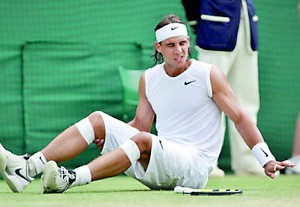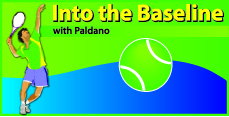The Elusive art of ‘Game Making’
View(s):In the recently concluded 2013 Monte Carlo ATP Masters, Novak Djokovic won the title for the first time breaking Rafael Nadal’s eight year domination.
In an elusive game, Djokovic caged Nadal deep in the middle third of the court most of the time. From that position Nadal’s cross court shots become an ineffective shallow angle and down the line’s became risky inside out strokes over the high ends of the net.
Nadal’s long standing knee-injury disturbed his balance to serve well in the final stages of the match. Last few games and in the deciding tie break, Nadal’s walk had a noticeable discomfort. It would have not gone unnoticed by Djokovic. Affected by injury Nadal’s ground strokes lost its effectiveness and too many unforced errors surfaced. These gave Djokovic the tie break at 7 /1, the third set and the title.
Magic and a miracle
The Elusive art of ‘game making’ is to tactically restrict the opponents. It is achieved with effective target and shot selection, in modern jargon it’s called ‘setting up’ to win. It is not easy to notice them unless you are alert and aware of its existence. “First, I must find the winning game, then I can to win” said legendry Arthur Ash of USA. In the same vein “to win, you must find out what will win” said Ismail El Shafei of Egypt, one of the four players to beat Borg in Wimbledon. Effective games are some of the best kept secrets of Tennis. Do not expect those to be revealed by the player in their post match interviews. A good winning game is a magic and a miracle.
Why are Indians not in grand slams?
In the 50th year felicitation ceremony for the former Indian Davis cup team which reached the first finals against Australia, reporters asked Indian stalwart Krishnan, why India does not have many players in grand slam singles draw as it used to? He said“it is not because Indian players lack talent, but they fade away because their game is not maturing enough to stand up to ‘open Tennis’ requirements”. Open Tennis for world ranking is all about being effective in the elusive art of game making. Too few seem to notice and master this.
Reality unknown; who is responsible?
What goes into making an effective Game? If you can answer this, you have played ‘Open Tennis’. In today’s Development Tennis, ‘Game Making’ is almost never discussed, explored, sought after or practiced. Our training systems and environment does not address it. This keeps the secrets of the game, unknown to players until it is too late to master. Game making defines the ‘functions’ to the player’s technical stroke making ability. Without functions stroke making becomes a decorative ornament. ‘Open Tennis’ is all about functional strokes towards effective ‘game making’. Those players, who do not take the responsibility to mature into open Tennis, eventually drop off, which usually happens around 17 years of age. Sports intelligence and ingenuity are qualities that players must foster to develop into Open Tennis standards and they are character based.
Awareness for game making
Self, Court, Opponent and Scores are the basic awareness factors that lead players into a good game. Each of them demands noticing and steering changes all the time during the match.
Playing to the score with right tactics will restrict opponent. Reading opponent all time will reveal what will win. Positioning and target  selection gives the court advantage. ‘Self before opponent’ will keep the player in the effective match reaction. “Keep your senses open and your reaction will peak”. Often players fail to see the challenge that they face. Awareness is easily disturbed by anxieties and distractions. Continuous sighting of the ball movement without a break is the life line to survive in a match. To be aware means ‘you are a winner’.
selection gives the court advantage. ‘Self before opponent’ will keep the player in the effective match reaction. “Keep your senses open and your reaction will peak”. Often players fail to see the challenge that they face. Awareness is easily disturbed by anxieties and distractions. Continuous sighting of the ball movement without a break is the life line to survive in a match. To be aware means ‘you are a winner’.
Skills are Performance dependent
Tennis is a skill. Four major areas go into effective game making skill and all of them are performance dependent. First; Strategy for the match, sets and games. Second; Tactics must lead and not follow. Third; know your opponent, dictate and restrict them. Last; self, perform to win. Perform to make tactics effective.
Compile your game
The Tennis score card shows only the winning games. Winner of a Game will wipe out opponent’s points won in the final score card result. Tennis scoring system works in that manner. In the final score card, tie breaks show the rallies but not the games. Work to register what was won in the score card by compiling winning games effectively. This aspect may need more explanation than what is said here.Be practical
A match does not give the players a great deal of time to think, but the following two aspects will help any player. First, ‘Game Making’ must be made simple. Next, is to train and practice for good instinctive reactions. What is simple can be most effective and often difficult to achieve. This works entirely on the practical capabilities of each player. Get smart and master the Elusive art of ‘Game Making’.
georgepaldano@yahoo.com
Follow @timesonlinelk
comments powered by Disqus
















